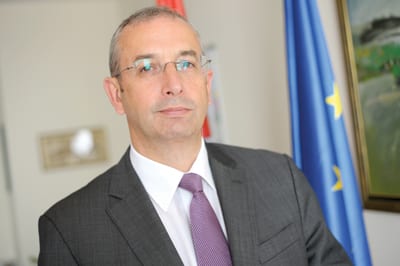The European Commission has recommended opening a further chapter – on bringing Serbian public procurement into line with EU standards, a crucial step in tackling corruption. Beyond that, Serbia is working on its negotiating position for a number of other chapters, so I am confident that we will see further movement in the next few months.
Accession talks are unlike any other negotiation. It is a win-win interaction, as the EU strongly supports Serbia in adopting and implementing the rules and regulations that, along with our shared values and history, are the foundation of the European Union. Polls show that Serbian citizens want to see reforms that will modernise the Serbian economy and create a fairer society.
Serbia has entered the process of EU accession negotiations and now wants to intensify these negotiations as quickly as possible and open all negotiating chapters. What is needed to accelerate this process?
Serbia has made good progress in the negotiations, opening four chapters since December 2015. This is a very good start. There now needs to be a stronger focus on implementing reforms under those chapters – for example, on improving the accountability of public finances, implementing commitments in the dialogue between Belgrade and Pristina or moving forward on measures to reduce the backlog of old cases in the Serbian courts.
 The European Commission has recommended to the Member States the opening of a further chapter – on bringing Serbian public procurement into line with EU standards, which is a crucial step in tackling corruption.
The European Commission has recommended to the Member States the opening of a further chapter – on bringing Serbian public procurement into line with EU standards, which is a crucial step in tackling corruption.
Beyond that, Serbia is working on its negotiating position for a number of other chapters, so I am confident that we will see further movement in the next few months.
The accession process is all about taking that modernisation forward. And this is supported by considerable EU financial assistance in the form of grants, around €200 million per year, which is mainly devoted to helping Serbia adopt EU standards in areas such as food safety, water quality or judicial efficiency, where there is a direct impact on business and on citizens’ quality of life.
NALED is a regular contributor of information on improvement or the lack of improvement in the business environment in our country for the EU report on Serbia’s progress in the accession process. How useful is this information for the European Commission?
NALED’s work on improving the planning legislation in Serbia has made a big difference in an area of great interest to current and potential future investors. What is especially important in NALED’s work is the capacity to combine experience and expertise from the civil sector, private business and government.
Serbia has the EU’s full support for the accession process, which needs to involve civil society to the maximum possible extent. The media will also play a key role by providing a forum for informed debate
The European Commission and the EU Delegation are entrusted by the EU Member States with monitoring all matters relevant to the accession negotiations and producing an annual report. So having a variety of reliable official, public and media sources is enormously helpful in steering the negotiating process forward. Issues can be spotted and addressed early on, and energies and time focused on priorities. NALED is well placed to support this effort.
It seems that the accession process is progressing and that the expectations of the economy, local authorities and civil society in Serbia, in terms of EU funds, are ever-increasing. How can efficiency be improved in terms of the absorption and use of money?
Serbia makes good use of EU funding, as is clear from the most recent report from the European Court of Auditors. To be even more efficient, Serbia needs to boost the capacities of its institutions, to have mature and well-prepared programmes, and an effective and motivated workforce involved in the implementation of EU funds.
Having a variety of reliable official, public and media sources is enormously helpful in steering the negotiating process forward. Issues can be spotted and addressed early on, and energies and time focused on priorities. NALED is well placed to support this effort.
A high priority in the period ahead will be to ensure qualified personnel are in place to manage the EU programme for agriculture and rural development (IPARD). I recently visited the teams at the Ministry of Finance that are responsible for implementing EU-funded programmes under the supervision of the EU Delegation. They are doing a great job.
What are your expectations in terms of the political and economic direction of Serbia in the next five years, and how important will be it for civil society organisations like NALED to participate in routing the European path of our country?
The next five years will be crucial for implementing reforms and preparing for accession. I would like to see a full implementation of the Action Plans for chapters 23 and 24 and the independence of institutions like the judiciary well entrenched.
 It would also be good to see the Brussels agreement between Belgrade and Pristina being implemented by both sides, enabling further steps to be taken towards comprehensive normalisation – which is the goal established under Serbia’s negotiating framework for EU accession.
It would also be good to see the Brussels agreement between Belgrade and Pristina being implemented by both sides, enabling further steps to be taken towards comprehensive normalisation – which is the goal established under Serbia’s negotiating framework for EU accession.
I would also like to see progress with the adoption of environmental legislation – and its implementation through a well-coordinated programme of infrastructure investment. This will determine the speed of Serbia’s accession to the EU.
Serbia has the EU’s full support for the accession process, which needs to involve civil society to the maximum possible extent.
The media will also play a key role by providing a forum for informed debate. The latest good economic news, which shows that growth is broad-based and here to stay, shows clearly that Serbia is on the right track.